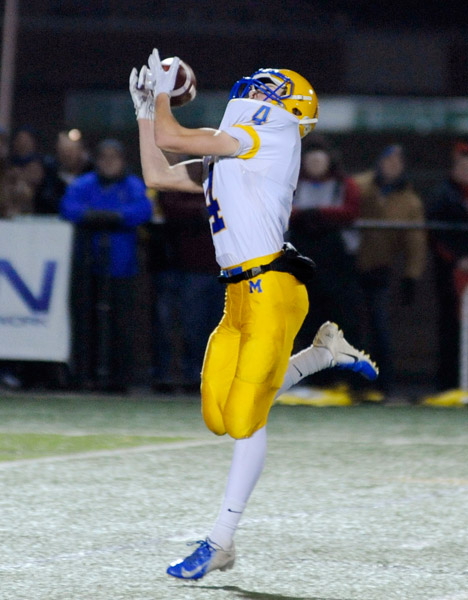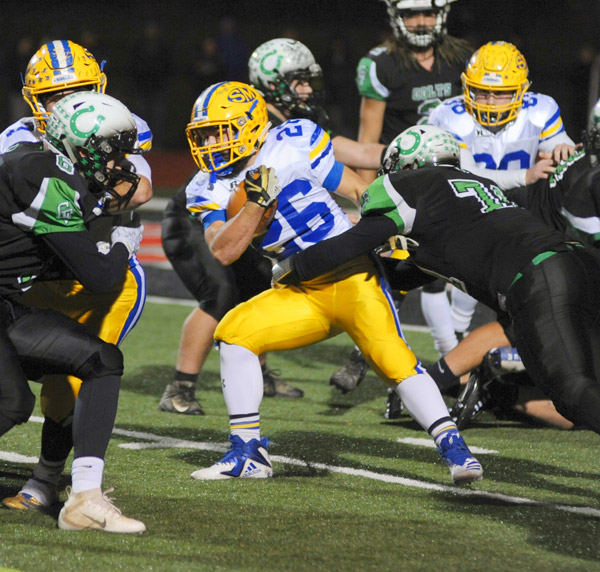Friday, November 23rd, 2018
Curtain Call
Overman a top player for Minster during 1950s
By Robb Hemmelgarn
Over the past seven-plus decades, Minster football has regularly been blessed with outstanding talent on the gridiron.
In the late 1950s, Jim Overman made his mark as one of the true athletic greats in the history of Minster High School. Overman affixed himself into the Minster offense under head coach Paul Maltinsky when he earned a starting backfield spot prior to the 1956 campaign.
"Back then high school sports were in their infancy compared to today. I always say that today's athletes are bigger, stronger, and quicker than we were in our era," said Overman, now a semi-retired dentist living in Minster. "Today's athletes seem to compete at warp speed compared to what we did, but we were still very, very competitive back then."
Over the next four seasons, Overman entrenched himself as one of the toughest competitors in the area and his career was highlighted by finishing his senior season with a 7-1 overall record, which at the time was the most wins for a season in school history. He was elected as team captain and Most Valuable Player that season in 1959 and earned first team honors on the Tri-County League All-Star Team. He averaged more than eight yards per carry and many of his numbers remained in the top 10 in program history years following his graduation.
"By the time I reached my senior year, we had laid the ground work for a good season, but we just didn't know how good we could be," Overman commented. "We lost early in the season to Piqua Catholic, but from there we went on to finish 7-1. Our competition was incredibly strong as six players in the Tri-County League went on to eventually play football in college."
Coinciding with his skills on the football field, Overman was also a standout on the baseball diamond and basketball court during his years in a Wildcat uniform. As a sophomore, he was the starting point guard on a squad which finished the regular season 20-0 and as a junior and senior, he earned first team honors on the hardwood on the Toledo Blade's annual All-Star team. Although he could have furthered his playing career in any sport, Overman elected to head to the University of Dayton to play Division I football.
"I was never blessed with outstanding speed in high school, and was always told I was too slow to play in the backfield in college," he pointed out. "That was all the motivation I needed, so I worked on my sprints non-stop by wearing a weighted vest and by the time I arrived at UD, I had the quickest start of anyone in the backfield. I may not have won 100-meter dashes, but I hit the line quicker than any of the other backs."
While at UD, Overman was a two-time team MVP and he is currently in the school's athletic hall of fame. "I was very lucky to make it through my college career without any major injuries and I prided myself at always being in the best physical condition," he advised. "In the fall of 1963, the NCAA allowed Division I athletes to compete on both sides of the ball, so in six of our ten games that year, I played the full 60 minutes. I remember playing at Bowling Green on a hot September day and I weighed myself afterward and had lost 13 pounds!"
With college in the rearview mirror, Overman wasn't quite ready to hang up the shoulder pads and eventually landed in the Canadian Football League.
"We didn't win a lot of games while I was at UD, but fortunately I gained some attention and signed with Winnipeg in the Canadian Football League. I was really hoping to sign with San Diego in the American Football League since they had expressed some interest, but when that didn't happen I headed to Canada," said Overman, who signed with the Winnipeg Blue Bombers. "I signed for $500 and made $8,500 overall, but eventually I decided to return to the states and attend dental school while playing semi-pro ball and rugby."
During the winter of 1968, while a senior in dental school, Overman phoned Bud Grant, his former coach in the CFL, who was now the head coach of the Minnesota Vikings. Overman was invited to try out with the Vikings and headed to Minnesota. A few weeks later, the news was broken to him that he was traded to the Atlanta Falcons, where he remained until soon being cut, thus bringing an end to his football playing career.
"It's important to understand what athletic competition at any level does for laying the groundwork for later in life," Overman, who was elected to the Minster Athletic Hall of Fame in its inaugural class in 2012, concluded. "The ups and downs you experience in athletics carry over all throughout life and in the end, we will remember not the wins or losses, but more important how we have played the game."


